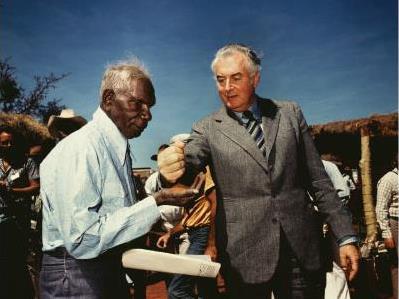Gough Whitlam pouring a handful of sand into Vincent Lingiari’s hand. Cover image of A Handful of Sand: The Gurindji Struggle, After the Walk-off By Charlie Ward.
Fifty years ago, prominent Country Party parliamentarian and grazier, Peter Nixon, said, ‘The government believes that it is wholly wrong to encourage Aborigines to think that because their ancestors have had a long association with a particular piece of land, Aborigines of the present day have a right to demand ownership of it.’
This was the Australia of 1966. It was a time when the Australian government had granted a lease to the English Vestey brothers of almost 90,000 square kilometers of land on which to run some 20,000 cattle – a thriving business which was given favourable tax treatment while employing Aboriginal people on starvation wages.
So in August 1966, some 200 Gurindji people, led by Vincent Lingiari, walked off the Vesteys’ Wave Hill pastoral lease in protest at discriminatory rates of pay and poor working conditions. They then set up their own community which they intended to be a co-operative venture on land that they believed they should own.
Charlie Ward’s meticulously researched history of this action and its aftermath is the outcome of years of work by a man who has lived with with the Gurindji people and is also well informed of the actions and attitudes of the kartriya – the whitefellas.
The title of the book refers to the well publicised symbolic gesture of Gough Whitlam pouring a handful of sand into Vincent Lingiari’s hand (an action that was repeated a second time for the cameras). That ceremony marked the culmination of more than eight years of struggle by the Gurindji people to obtain land rights. Apparently, Lingiari didn’t know what to do with the handful of sand so he put it behind his back and let it trickle to the ground; this is not to trivialise the situation but to illustrate the fine detail Ward brings to this history, although at times the sheer volume of such detail makes for difficult reading.
The story following Whitlam’s presentation of the land title deeds is not a happy one although undoubtedly it helped to advance the land rights movement. The ceremonial occasion also inspired the famous song by Paul Kelly and Kev Carmody – ‘From Little Things Big Things Grow’ – a song whose verses capture much of the story.
Among the important insights Ward shares with his readers is that none of the hundreds of well-intentioned people who preached consultation with the Gurundjis learned the language of the local people. Time and again it is clear that the cultural divide was immense. Tragically, most of the white people who actually tried to help the Gurindji failed as a result of this divide, clearly exhibiting an inadequate understanding of the incompatibilities between Gurindji culture and their own. Similarly, the Aboriginal people were also hampered in their interactions with white authority, shackled as they were by their lack of understanding of white culture.
In addition to the detailed reconstruction of events Ward presents the reader with more than fifty photographs, some maps, a list of abbreviations, and a glossary as well as an extensive bibliography. But what makes this history so valuable is that Charlie Ward not only carefully recounts in great detail what happened, but why it happened, what people’s expectations were and why these expectations were so often unmet. Anyone interested in the way forward for Aboriginal communities will find this book most helpful.
Rating: 3 1/2 stars out of 5
A Handful of Sand: The Gurindji Struggle, After the Walk-off By Charlie Ward
Published: August 2016
ISBN (pb): 978-1-925377-16-3
ISBN (e-book): 978-1-925377-18-7
Series: Australian History
Monash University Publishing





